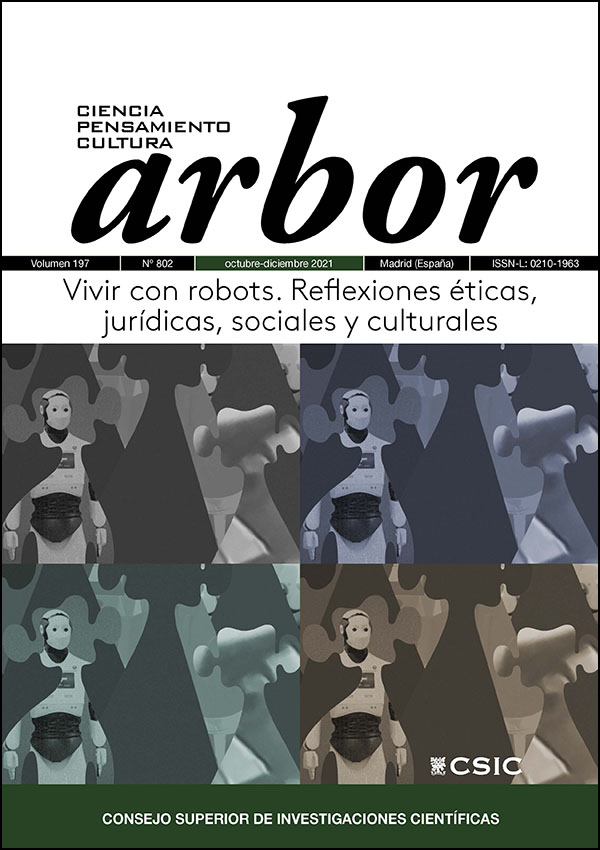Philosophical incidences in the digital society: ideologies, disinformation and epistemological confusion
DOI:
https://doi.org/10.3989/arbor.2021.802008Keywords:
Disinformation, fake news, post-covid society, epistemological confusionAbstract
Through the dissemination of informative elements (i.e., any item created and disseminated with the purpose of conveying information) in the digital society, disinformation modifies 1) the social and political ideology of users of social networks and other digital tools, as well as their worldview and overall ideas about reality; 2) the ethical behaviour of the subject in the world, which includes violent, terrorist, and stochastic terrorist acts; and 3) the conditions of veracity that are granted to a fact in order to label it as truthful, which results in the phenomenon of epistemological confusion, whereby veracity is granted to a fact just by wishing it to be true, instead of appealing to voices having recognized authority.
Downloads
References
Bautista García-Vera, Antonio (1994). El papel de los intelectuales y la no neutralidad de la tecnología: razones para unos usos críticos de los recursos en la enseñanza. Revista de educación, 303: 243-258.
Bermúdez Vázquez, Manuel (2019). Análisis del concepto «posverdad» desde la óptica de la retórica clásica. Diálogo filosófico, 105: 341-352.
Bleakley, Paul (2018). Situationism and the recuperation of an ideology in the era of Trump, fake news and post-truth politics. Capital & Class, 42 (3): 419-434. https://doi.org/10.1177/0309816818759231
Cinelli, Mateo; Morales, Gianmarco; Galeazzi, Alessandro; Quattrociocchi, Walter y Starnini, Michele (2021). The echo chamber effect on social media. PNAS March 2, 118 (9): e2023301118. https://doi.org/10.1073/pnas.2023301118 PMid:33622786 PMCid:PMC7936330
Echeverría, Javier (1999). Los señores del aire: Telépolis y el tercer entorno. Barcelona: Ediciones Destino.
Echeverría, Javier (2002). Ciencia y valores. Barcelona: Ediciones Destino.
Floridi, Luciano (2011). The Philosophy of Information. Oxford: Oxford University Press. https://doi.org/10.1093/acprof:oso/9780199232383.001.0001
Hamm, Mark S. y Spaaij, Ramón. (2017). The Age of Lone Wolf Terrorism. Nueva York: Columbia University Press. https://doi.org/10.7312/hamm18174
Isaac, Mike y Roose, Kevin (2018). Las noticias falsas inundan WhatsApp en Brasil. The New York Times. Disponible en https://www.nytimes.com/es/2018/10/23/espanol/brasil-whatsapp-noticias-falsas.html (consultado el 01-09-2021).
Nguyen, An y Catalan-Matamoros, Daniel (2020). Digital Mis/Disinformation and Public Engagement with Health and Science Controversies: Fresh Perspectives from Covid-19. Media and Communication, 8 (2): 323-328. https://doi.org/10.17645/mac.v8i2.3352
Nicolás, Juan Antonio (2019). Posverdad: cartografía de un fenómeno completo. Diálogo filosófico, 105: 302-340.
Nissenbaum, Asaf y Shifman, Limor (2015). Internet memes as contested cultural capital: The case of 4chan's /b/ board. New Media & Society, 19 (4): 483-501. https://doi.org/10.1177/1461444815609313
Ollero, Daniel J. (2019). Así es 8Chan, la web proscrita en la que los asesinos de masas cuelgan sus manifiestos. El mundo. Disponible en: https://www.elmundo.es/tecnologia/2019/08/07/5d49b7dbfc6c832a328b4611.html (consultado el 01-09-2021).
Önnerfors, Andreas (18 de marzo de 2019). 'The Great Replacement': Decoding the Christchurch Terrorist Manifesto. Centre For The Analysis Of The Radical Right. Disponible en https://www.radicalrightanalysis.com/2019/03/18/the-great-replacement-decoding-the-christchurch-terrorist-manifesto/ [fecha de publicación, 18-03-2019; fecha de consulta, 01-09-2021]
Ortega Dolz, Patricia (2015). El Estado Islámico tiene 46.000 cuentas en Twitter. El país. Disponible en https://elpais.com/politica/2015/07/24/actualidad/1437753480_585841.html (consultado el 01-09-2021).
Ortiz de Guinea Ayala, Yolanda y Martín Sáez, José Luis (2019). De los bulos a las fake news. Periodismo, contenidos generados por el usuario y redes sociales. Creatividad y sociedad: revista de la asociación para la creatividad, 30: 104-124.
Palomo, Miguel (2021). How disinformation kills: philosophical challenges in the post-Covid society. History and Philosophy of the Life Sciences, 43 (51). https://doi.org/10.1007/s40656-021-00408-4 PMid:33783652 PMCid:PMC8009070
Paolillo, John C. (2018). The Flat Earth phenomenon on YouTube. First Monday, 23 (12). https://doi.org/10.5210/fm.v23i12.8251
Pérez Sedeño, Eulalia (2005). Las ligaduras de Ulises o la supuesta neutralidad valorativa de la ciencia y la tecnología. Arbor: Ciencia, pensamiento y cultura, 181 (716): 447-462. https://doi.org/10.3989/arbor.2005.i716.402
Queraltó, Ramón (2003). Ética, tecnología y valores en la sociedad global: el caballo de Troya al revés. Madrid: Tecnos.
Queraltó, Ramón (2008). La estrategia de Ulises o ética para una sociedad tecnológica. Sevilla: Doss.
Ruiz Gómez, Luis (2014). Neutralidad de red y desarrollo de las TIC. RUE: Revista universitaria europea, 20: 73-90.
Ruiz Martínez, José Manuel (2018). Una aproximación retórica a los memes de internet. Revista Signa, 27: 995-1021. https://doi.org/10.5944/signa.vol27.2018.21856
Westerlund, Mika (2019). The Emergence of Deepfake Technology: A Review. Technology Innovation Management Review, 9 (11): 39-52. https://doi.org/10.22215/timreview/1282
Published
How to Cite
Issue
Section
License
Copyright (c) 2022 Consejo Superior de Investigaciones Científicas (CSIC)

This work is licensed under a Creative Commons Attribution 4.0 International License.
© CSIC. Manuscripts published in both the printed and online versions of this Journal are the property of Consejo Superior de Investigaciones Científicas, and quoting this source is a requirement for any partial or full reproduction.All contents of this electronic edition, except where otherwise noted, are distributed under a “Creative Commons Attribution 4.0 International” (CC BY 4.0) License. You may read here the basic information and the legal text of the license. The indication of the CC BY 4.0 License must be expressly stated in this way when necessary.
Self-archiving in repositories, personal webpages or similar, of any version other than the published by the Editor, is not allowed.
Funding data
Ministerio de Ciencia e Innovación
Grant numbers FFI2017-82535-P
Universidad Complutense de Madrid
Grant numbers PR65/19-22446















